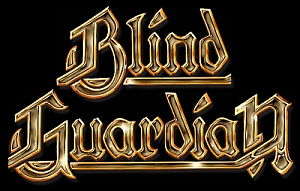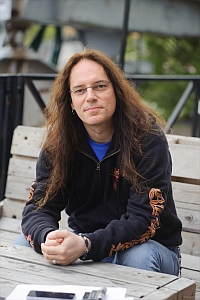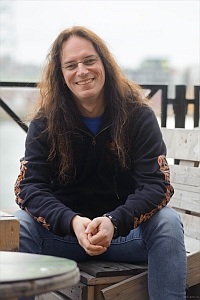 Interview with
Interview withMarcus Siepen (guitars) from Blind Guardian
BLIND GUARDIAN was one of my favourite bands in my youths, first we listened to pirate copies (as at that times, many years ago in Russia there was no real market for official music) and then to proper CDs. Therefore it was exciting to see a person from the band live and have a good talk with him. At the day of their Helsinki gig, we sit on the outside terrace of Nosturi club together with BLIND GUARDIAN’s guitarist Marcus Siepen. He is really easy-going, very positive and open. When answering, he likes to play with voice to make his answers more articulated.
Reflections of Darkness [RoD]: Hello Marcus, nice to meet you. We are doing the interview for Reflections of Darkness website. You have been few times in Finland, how do you find the country, what is your experience so far?
Marcus: It’s very nice! [In past] we played that club [Nosturi] a couple of times, we played [Helsinki-based large] Tuska festival, it’s great to be here. We’re here since yesterday. My wife is here, we have some friends here in Helsinki, we walked through town all day long, spent some time in some pubs, it’s great. It’s a good crowd, a good audience, it’s fun to play here. It’s always good to be back.
RoD: Some interviews only focus on current show-business stuff going, such as new albums and shows, and in such case it is a bit difficult to see a real person behind that. To look a little on personal side, could you maybe tell us, what type person you are, outside of the band business?
Marcus: Well, I am just a normal guy, I am married, I have a twenty-year-old son, I’ve always been a music fan, for all of my life. Not just metal actually, I don’t really care for genres, for labels, that people put on for music. For me it is just two kinds of music: the one that I like and the one I dislike. If a song attracts me for whatever reason, then it is a good song, if it’s metal, or pop, or rock, or punk, whatever it might be. I love reading, love watching movies, love playing computer games, love spending time with my family. Love biking.
RoD: Speaking about music, regardless of genre, to what other band’s gigs you would go?
Marcus: Last gig, that I enjoyed a lot, for example, was BEHEMOTH, a black metal band from Poland. They put out an album called ‘The Satanist’, it was last year I think, amazing album, amazing live band. I enjoyed quite a lot of ORPHANED LAND shows, because they opened up for us in Europe, and I always been a fan of that band, and they are good friends, and it’s always great to have a band on tour with you that you actually really like, and watch all the shows.
RoD: It is actually quite interesting, because it is so opposite - black metal BEHEMOTH and ORPHANED LAND, I won’t say Christian, but quite close...
 Marcus: Very positive and stuff, yeah! And the other one is pure evil (laughs).
Marcus: Very positive and stuff, yeah! And the other one is pure evil (laughs).RoD: How your sound has evolved in the last album, what new things, if any, can be found there?
Marcus: Oh, we tried a lot of new things, it’s always one of the goals for us. We do not want to repeat ourselves, we always look for something that we did not tried so far, for example, we experimented a lot with down-tuned 7-string guitars, make the guitars sound different, shift them below, that opens up a range for more orchestration, things like that. With those guitars you tend to play differently, different riffs, so attitude of songs changes a bit. We experimented a lot with some futuristic sound effects, that we added on couple of songs, it gives them a different character. We - obviously - worked again with orchestration, big choirs (couple of choirs actually). On previous albums, we worked with the orchestra, and this is something we really liked and wanted to experiment with a bit more, which we did on this album. And on the other hand, in past, on the old albums we added a bit of “folkloristic” elements in the music, that we skipped completely on this one, because we thought that [the elements] did not fit on the album. At some point we were working on an acoustic song, that was rather folkloristic, and at some point we realized that it won’t fit at all to the rest of the songs, so we just skipped it. We might use it in the future, I do not know. So, it’s the beginning of songwriting - you always start from scratch and you try to look for new things, that you didn’t do before, and worked into core elements of BLIND GUARDIAN, which have to be there, of course. We are still BLIND GUARDIAN, we still have the same roots, they never change.
RoD: Your sound on earlier albums was rather rough and heavy, before you reached your trademark sound (around Tales of the Twilight World). Do you agree, that bands always start brutal and then realize something else, maybe become more drawn to melodic side?
Marcus: I think it takes some time to develop your style! Most bands on the debut album: that’s the point where the journey starts. Back then, obviously, we had our influences, and we still had to look for our own style. We wanted to be heavy, fast, loud, aggressive. And at some point you realise, [that you found something], that’s what I wanna do - that’s how development of the band starts.
RoD: Do you have any plans to repeat an acoustic album [Forgotten Tales, 1996]?
Marcus: It was a fun thing to do, and it was a very spontaneous thing. Because the whole thing, the whole process happened across five weeks, from the de idea was born till the moment when we finished the recordings. So it was very, very spontaneous, we were like: “let’s do it, why not, we can rearrange those songs, and we could do this, and we could do that”, and we just did it. It was a lot of fun, and we may do it again one day. But there are no fixed plans so it is not like we say “ok, we will do it again in 2017”. It might happen again, and I am pretty optimistic it will, but I have no idea when it will be.
RoD: When you work with the orchestra, how the “chemistry” between you and classical musicians is going?
Marcus: I think in the beginning they were a little bit sceptical, because there are two different worlds clashing with each other, the classical orchestra and the metal band. I think it changes as soon as those guys start playing the songs, I do not know what they were thinking in the beginning - maybe they had the [sceptical] attitude, we do a classical stuff, now we have do a metal stuff - then they get their scores and they started playing it, and soon I see them, like, understanding and starting to appreciate it. It might not be their taste of music, but they appreciate what we are doing, because [the material] is not an easy stuff to play, and they have to be where we want them to be.
RoD: And who does the orchestration of the songs?
Marcus: It is composed by us. Andre does his thing on keyboards, but we are not able to write a score for them. So we actually have to rely on help of some people who can do this, so they get our compositions and they turn it into the score for the orchestra. Obviously, you have to give them that score, you cannot give them a CD, like, “listen to that and then play it”, that does not work, they do need the written score. So we need the help of some people who can do this. We normally do not write down our songs. If we want to remember something, we record it and we listen to it. We never wrote down anything. So that’s two completely different worlds.
RoD: What you would like to deliver to your listener?
Marcus: I think music always should transport some emotions. If music does not touch you inside, then something went wrong. And obviously emotions differ from song to song, there is more aggressive stuff on the album, there is more melodic or calmer stuff, the emotions that are supposed to be transported, change depending on what song you are listening to. We want to take listener to the journey through the story that we are telling on the album. In this case, it is the whole concept of the album, we want to take them to a journey through each song, we try to create, you know, ups and downs within the song, there should be dynamics and we want them to follow us on that ride.
RoD: And last album, does it have some sort of concept, and how well defined?
Marcus: It does have a concept, very well defined, and it is based on couple of songs from ‘
 Imaginations’, that told a story that was never finished - the songs were ‘Imaginations form the other side’ itself, ‘And the story ends’ and ‘Bright eyes’. It is a story of a kid living isolated in the world similar to ours, that had an opportunity to step through a portal into a different world and become a hero, fighting for balance and on ‘Imaginations’ it was never told if he takes this step. When we were working on the ‘Best Of’ box set [published in 2013], Hansi realized that he never finished that story, and he had the idea to finish it now. That’s what we are telling on this story: it is maybe 20 years past, the boy is an adult by now, and we get to know that he never took that step, because he was just afraid, after all, he was just a child by then. And as a consequence of not taking this step, it had pretty bad effects on both worlds, and it’s just one open portal left, and this grown up, embarks on a journey to find that portal, take this step and fulfil his destiny.
Imaginations’, that told a story that was never finished - the songs were ‘Imaginations form the other side’ itself, ‘And the story ends’ and ‘Bright eyes’. It is a story of a kid living isolated in the world similar to ours, that had an opportunity to step through a portal into a different world and become a hero, fighting for balance and on ‘Imaginations’ it was never told if he takes this step. When we were working on the ‘Best Of’ box set [published in 2013], Hansi realized that he never finished that story, and he had the idea to finish it now. That’s what we are telling on this story: it is maybe 20 years past, the boy is an adult by now, and we get to know that he never took that step, because he was just afraid, after all, he was just a child by then. And as a consequence of not taking this step, it had pretty bad effects on both worlds, and it’s just one open portal left, and this grown up, embarks on a journey to find that portal, take this step and fulfil his destiny. RoD: I think this question comes up quite often. Are there any songs that you going to make after Game of Thrones?
Marcus: I started to work on a song that had a working title ‘Winter is Coming’ - which obviously is inspired by Game of Thrones, - we did not finish that song, so we still have finish it at some point. But it’s a working title, when you are working on a song, you have to give it a name on your computer, I just picked that one, it does not necessarily mean that final lyrics will be about that topic, but since Hansi also likes the books and the TV show, it is possible that one day we might do something about Game of Thrones.
RoD: And that song - is it a secret, which direction it will go, is it some kind of ballad, or aggressive one?
Marcus: It’s pretty aggressive trashy stuff. That’s all.
RoD: I noticed that you play very old songs, e.g. from the Follow the Blind [1989] album, when band has not yet arrived to its trademark sound. What makes you to include very old songs in your setlist?
Marcus: It’s part of our history. We try to cover all the periods in our career, and obviously, the focus is on showing the people what new songs are like, so there are four songs of the new album in the set. But we try to cover every album we did. We pick songs that we like to play, sometimes that we did not played for many-many years, and I think that mix is what makes it interesting. I do not like when a band goes on tour and just plays the new album, I like this mix as a fan myself. And I heard that the reactions on such a set list that we are normally playing are very-very positive. It’s a pretty balanced mix of old classics, new stuff and some stuff that we normally do not play that much. And we keep changing it a bit every day, we usually play around 18 songs, but we prepared 40-42, we adjust the set list a little be, because many people come to more just one show, so they get to see different sets. And also for us it is much more interesting like this, because we will be on the road until the end of next year, and it we would play very same 18 songs every single night, it would be hellish boring for us. Obviously we do not want that.
RoD: Does it happens to you if you come up with next song suddenly during the gig?
Marcus: Normally we prepare the set list on show days, before or after sound check. Once setlist is written down, that’s what we are going to play, normally no spontaneous changes.
RoD: German order. :)
Marcus: Yes! We are German band after all (laughs).
RoD: How life of a musician, especially touring, looks from the inside?
Marcus: Life on the road means: you are working for two hours a day, and the rest [of time] - you are waiting (laughs). Touring means waiting! You wait for the sound check to start, you wait for the shuttle to take you from the hotel to the venue, you wait for crew to finish preparing for sound check, after the sound check you wait for dinner to start, you wait for the show to start, and then you wait for the shuttle going back to a hotel. I am dramatizing it, you know. Touring is great, I love touring. But the waiting part is something most people don’t really see, because you actually spend quite some time on the day waiting. And - as much that I love traveling and see all the countries, there is one downside of touring: that you are separated from your family. We are all married, we all have kids, and once we are on the road, there is this separation. But it got much easier nowadays, because you have internet everywhere, you can call people, you can do video calls on Skype, so that makes it easier, at least. But being separated from your family is still sucks, though it’s part of your life as a musician. You jump between extremes - either you are gone completely, when you are touring, or you are at home completely when you are not touring, and when we’re working on new songs we’re home all day long. That’s how life of a musician is.
RoD: And just to round up the interview: if you would give people an advice, how to live better life, what would it be?
Marcus: As a musician: try to find your own style. And the most important thing is, do what you really want to do, do what’s coming from your heart. Because if you try to do something, musically, that you actually do not really feel like doing, but you are just doing because it is trendy at the moment, you will never be good at it, and you will never be convincing people, because people can realize, if something is coming from the heart, or not. I think that would be the best advice - whatever you do, do what you really feel like doing. (in big voice:) LISTEN TO ME! (laughs).
Pictures by Askar Ibragimov
Editor’s comments in square brackets






Comments powered by CComment